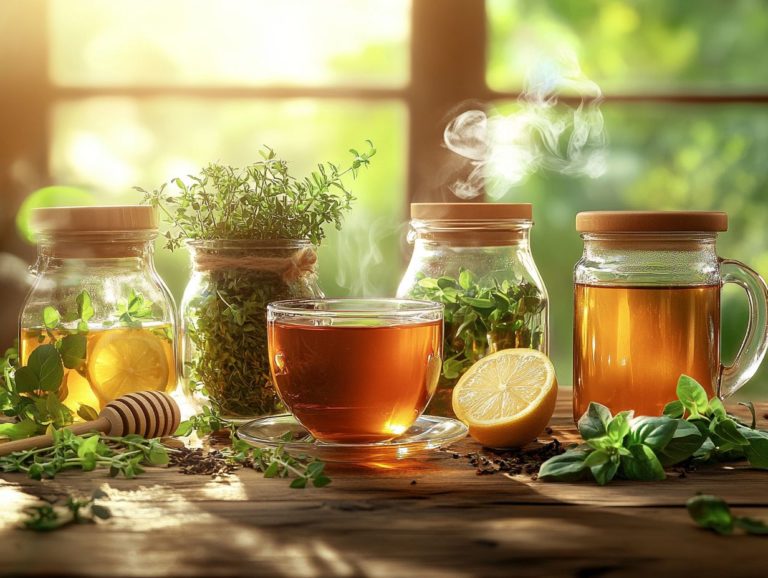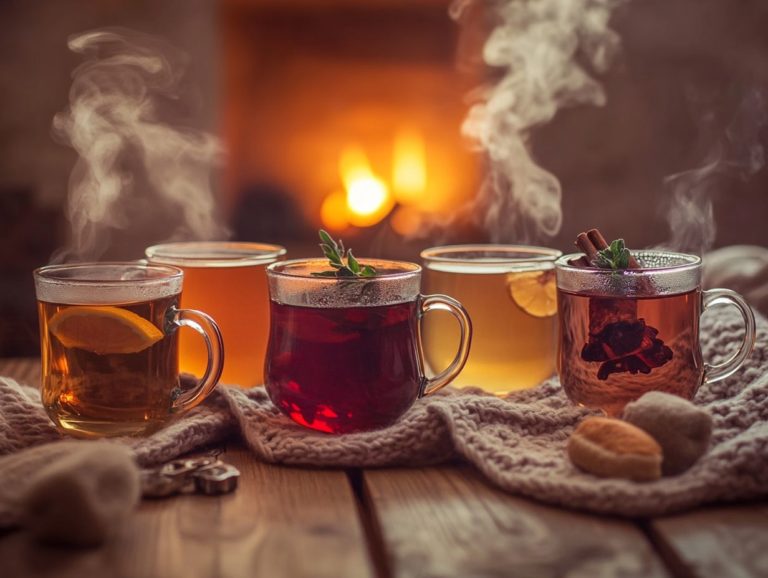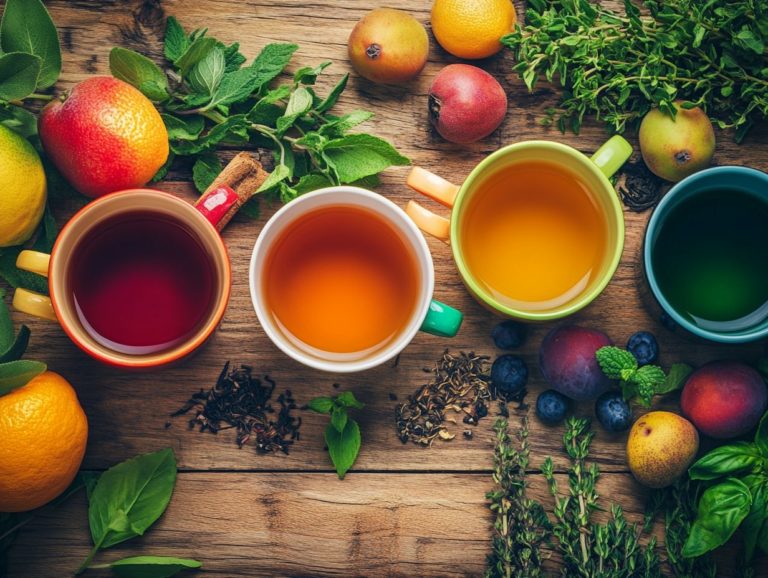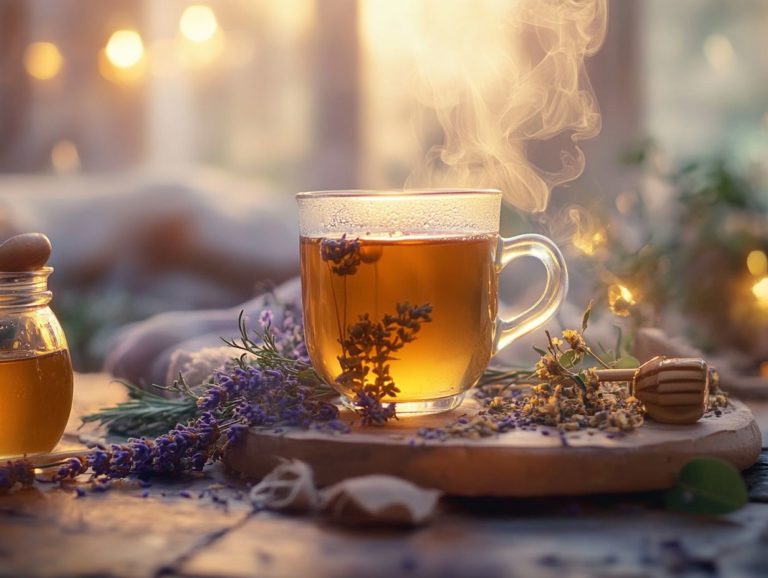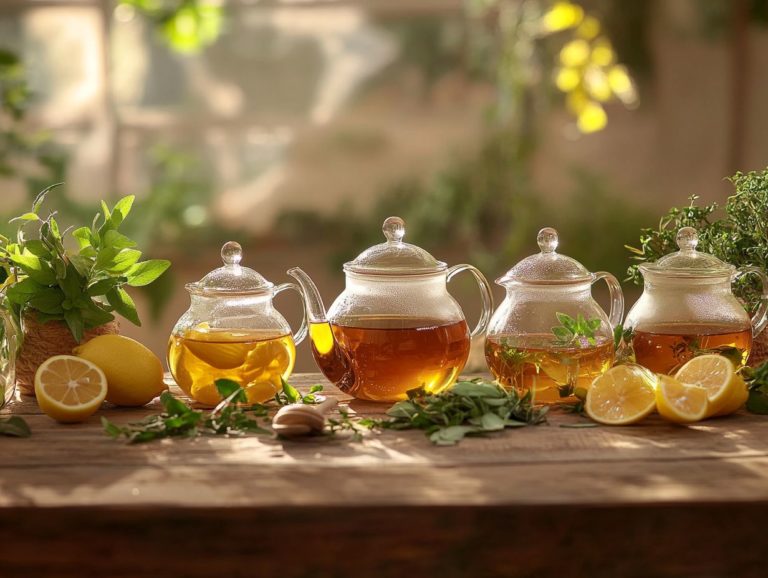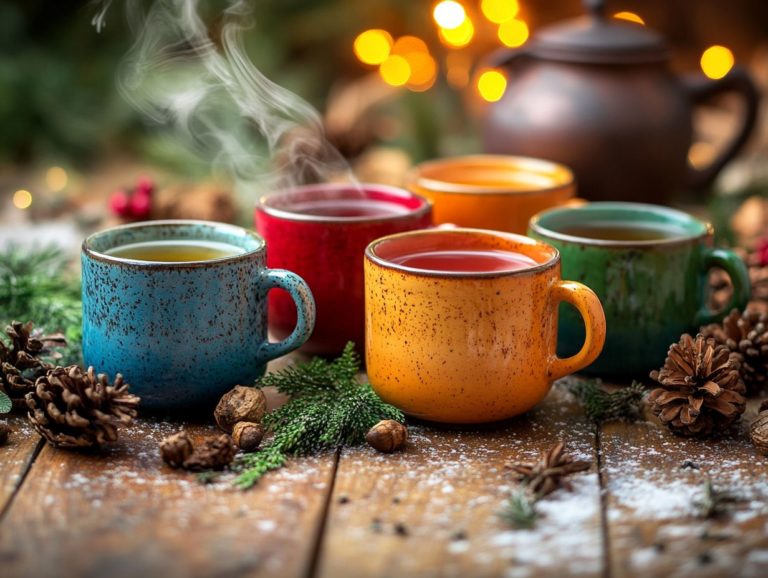How to Choose the Right Herbs for Tea
Herbal tea has emerged as a cherished beverage for many, celebrated not only for its delightful array of flavors but also for its myriad health benefits.
This guide delves into the essence of herbal tea, showcasing its diverse health perks and practical applications. You ll uncover essential factors to consider when selecting herbs, including flavor profiles and their medicinal properties.
Get ready to dive into the exciting world of herbal tea!
Prepare to discover popular herbal ingredients, master the art of brewing the perfect cup, and explore tips for storing your tea to maintain its freshness, whether you prefer loose leaf or teabag forms.
Contents
Key Takeaways:
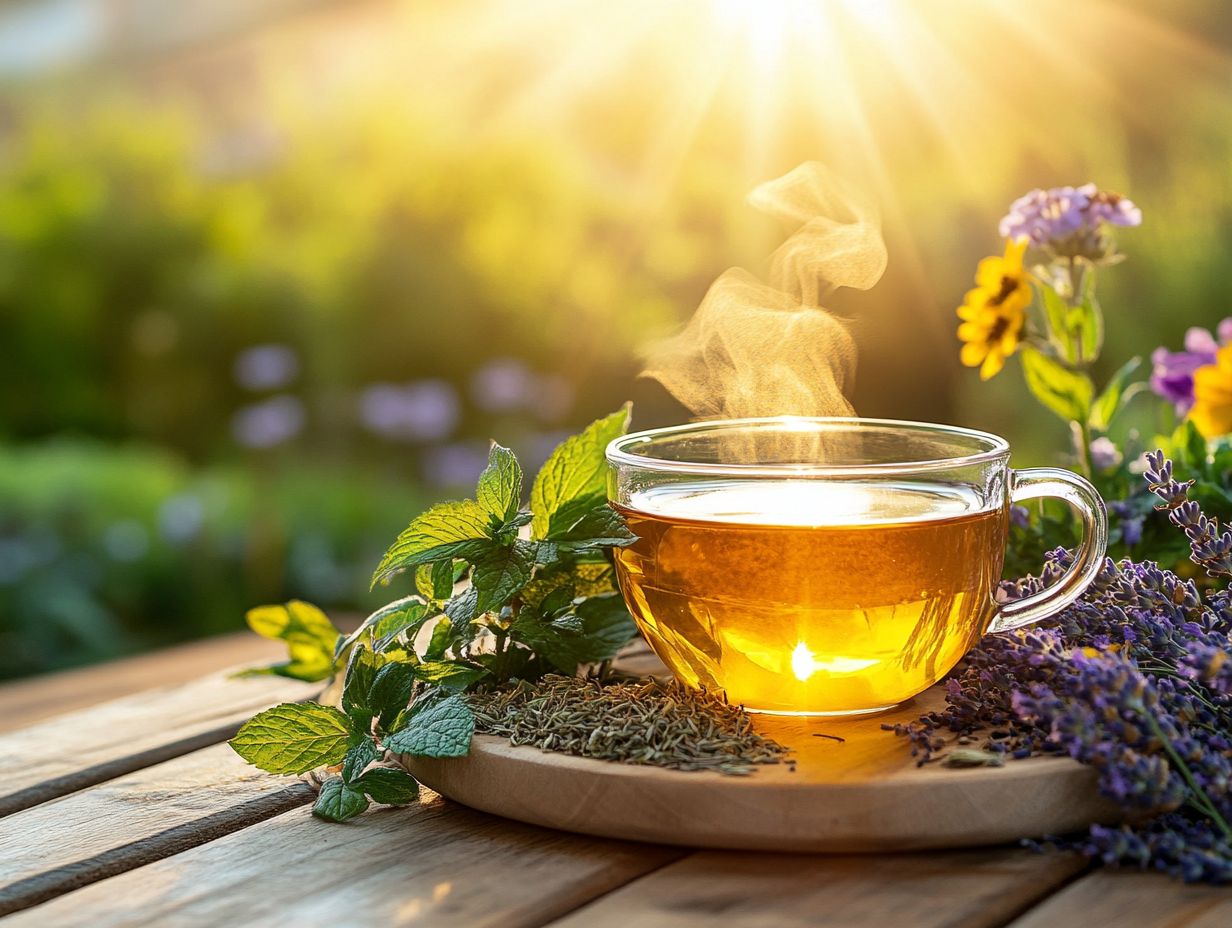
- Consider the flavor and aroma profile of herbs before choosing them for tea, as it greatly influences the taste of the final brew.
- Take into account the medicinal properties of herbs to ensure you are getting the desired health benefits from your tea.
- Consider the availability and cost of herbs, as some may be more expensive or harder to find than others.
What is Herbal Tea?
Herbal tea is a delightful infusion crafted from the leaves, flowers, and roots of various plants, setting itself apart from traditional teas derived from the Camellia sinensis plant. Unlike black tea, green tea, white tea, and oolong tea, herbal teas offer a vast array of flavors and benefits, making them an enticing choice for those like you who seek both enjoyment and wellness.
What distinguishes herbal infusions is their remarkable versatility. While traditional teas hinge on the processing of a single plant, herbal concoctions can incorporate a rich variety of ingredients herbs, spices, and fruits that elevate their complexity to new heights.
You’ll find the brewing methods differ as well. Traditional teas often demand precise temperatures and steeping times. In contrast, many herbal teas provide a welcome freedom, allowing you to steep them as loose leaf or in tea bags without the need for strict guidelines. For those looking to explore unique flavors, check out herbal tea variations that offer creative flavor combinations.
This flexibility mirrors their cultural importance; each herbal infusion is steeped in stories of plant medicine passed down through generations, celebrated in rituals around the globe. In myriad cultures, these infusions serve not merely as delightful beverages but as a bridge to nature and a natural approach to health, underscoring the diverse and profound role they play in daily life.
Benefits of Drinking Herbal Tea
Drinking herbal tea presents an abundance of health benefits, making it a favored choice for wellness enthusiasts and anyone striving to enhance their overall well-being.
From supporting digestive health to facilitating cleansing, a variety of herbal blends, like chamomile and peppermint tea, are renowned for their distinctive qualities.
Herbal teas often contain antioxidants that combat free radicals. Certain Ayurvedic infusions can offer soothing effects, fostering a harmonious balance in your daily routine, making them excellent herbal remedies.
Health Benefits and Uses
Herbal teas are celebrated for their remarkable health benefits and versatile uses, serving as natural remedies for a variety of ailments while promoting your overall well-being.
Take chamomile tea, for example; it s widely acknowledged for its calming effects. Ginger tea works wonders for digestion and can help alleviate nausea.
Detox teas, with their abundant antioxidants, support your body’s natural cleansing process, making herbal tea an excellent choice if you’re looking for nutritional benefits and therapeutic effects.
Peppermint tea is your go-to for easing headaches and boosting mental clarity, while hibiscus tea is praised for its heart health benefits, particularly in regulating blood pressure.
If stress weighs you down, calming herbal teas like lemon balm and lavender can provide soothing properties that significantly lower anxiety levels.
Every cup of herbal infusion not only nurtures your body but also offers a delightful ritual, inviting you to pause and reconnect with your senses, ultimately enhancing your emotional wellness.
Factors to Consider When Choosing Herbs for Tea
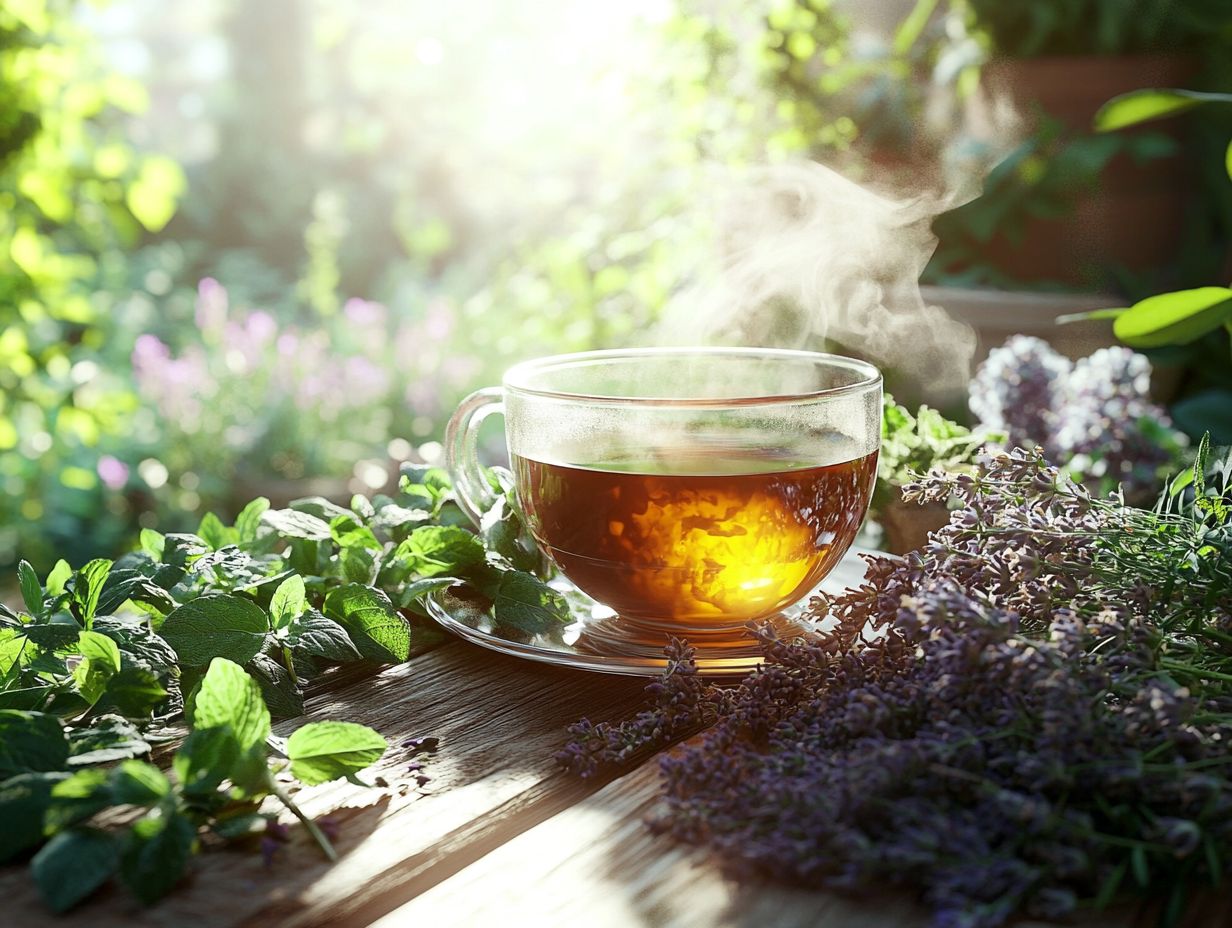
When choosing herbs for your tea, several key factors deserve your attention, including flavor profiles, health benefits, and preparation methods. Herbal teas are versatile and offer many choices, from aromatic herbs to those with bolder flavors.
Understanding the properties of medicinal plants is essential. This knowledge empowers you to brew a cup that will delight your senses and align with your health goals and unique taste preferences. For example, learning how to use hibiscus in herbal teas can enhance your tea experience.
Flavor and Aroma Profile
The flavor and aroma profiles of herbal teas create a wondrous tapestry. They range from the sweet, floral notes of hibiscus to the invigorating mintiness of peppermint. By understanding these diverse profiles, you can enhance your tea-drinking experience and inspire your creativity in crafting unique blends.
Selecting aromatic herbs that complement each other allows you to create a balanced and delightful infusion. Exploring a variety of herbal options reveals a world of possibilities, from the calming embrace of chamomile with its soothing, apple-like undertones to the bold spiciness of chai, rich with ginger and cinnamon. For those interested in more options, consider trying 5 delightful DIY herbal teas for wellness.
These elements not only elevate flavor but also enrich each sip with a delightful journey. Experimenting with different tea blends helps you uncover new combinations, such as pairing lavender with lemon balm for a refreshing effect. This showcases how the vibrant characteristics of each herb can beautifully intertwine, creating a symphony of flavors on your palate.
Medicinal Properties
The medicinal properties of herbal teas are rooted in the natural compounds in various plants, long cherished in traditional healing practices. Each type of herbal tea offers unique health benefits. Ingredients like ginger and chamomile are essential for addressing digestive troubles and stress relief.
Consider herbal teas infused with peppermint or hibiscus. Peppermint tea is known for its ability to soothe headaches and aid digestion, while hibiscus tea supports heart health and lowers blood pressure. To enhance your tea experience, learn how to brew perfect herbal infusions. These diverse medicinal plants provide delightful flavors and valuable health benefits.
Embracing these natural remedies can enhance both physical and mental well-being. This highlights the significance of plant medicine in modern wellness practices and the increasing popularity of eco-friendly tea options.
Availability and Cost
The availability and cost of herbal teas can vary significantly due to factors like sourcing, brand reputation, and whether you choose loose leaf or teabag forms. Many brands prioritize eco-friendly practices and sustainable herbalism, ensuring high quality while promoting environmental responsibility.
This commitment affects pricing; premium blends reflect superior quality and ethical sourcing. As you become more health-conscious and environmentally aware, you may notice a growing demand for high-quality, organic options.
The choice between loose leaf blends and conventional teabags also matters. Loose leaf tea is often perceived as more authentic and flavorful, reinforcing a brand’s dedication to quality. When shopping for herbal tea, you’re not just selecting a beverage; you’re investing in practices that support eco-friendly production and the preservation of natural resources. To enhance your tea experience, consider trying 5 delicious herbal tea blends that offer a delightful variety.
This holistic approach enhances your tasting experience and deepens your appreciation for the origins and impact of your herbal choices.
Common Herbs Used in Tea
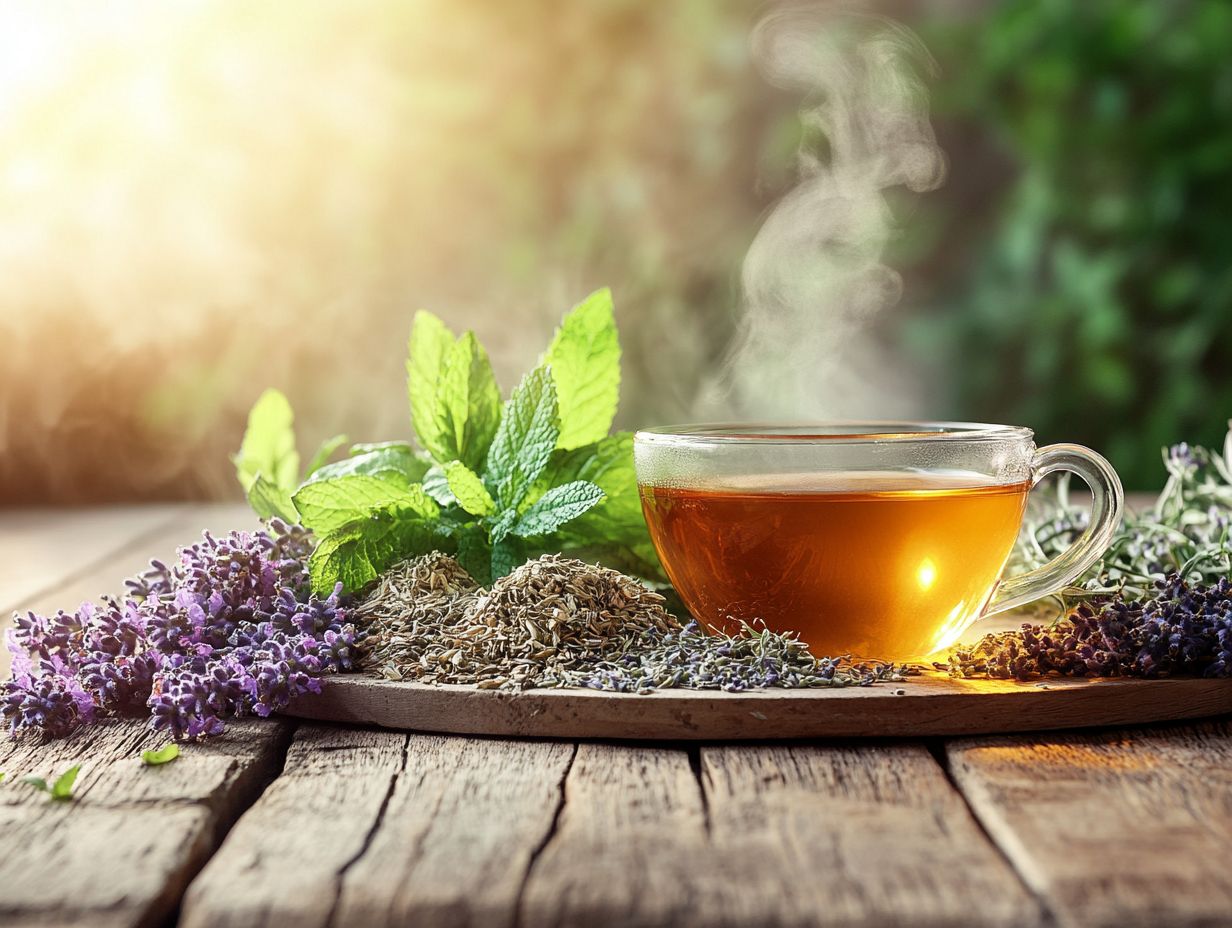
The world of herbal tea is a vibrant tapestry of flavors and benefits. Popular ingredients like chamomile, peppermint, ginger, and hibiscus each bring their own unique taste and health properties.
These delightful brews not only please the palate but also serve many wellness purposes. Discover the amazing benefits of these herbs to deepen your appreciation and understanding of herbal tea.
Popular Herbal Tea Ingredients and Their Benefits
When exploring herbal teas, you ll find that chamomile, peppermint, ginger, and hibiscus each offer unique health benefits and enticing flavors.
Chamomile is renowned for its soothing qualities, promoting sleep and easing anxiety. Peppermint refreshes as a digestive aid that can awaken your senses.
Ginger is celebrated for its anti-inflammatory prowess. Meanwhile, hibiscus, with its abundance of antioxidants, champions heart health with its potential to lower blood pressure.
These ingredients enhance both flavor and wellness. Chamomile s calming effects make it an excellent companion for unwinding after a long day, improving your sleep quality.
Peppermint can invigorate your senses and is perfect for morning enjoyment or as a post-meal refresher to soothe indigestion. Ginger alleviates nausea and digestive discomfort while boosting your immune system.
Let s not overlook hibiscus its tart flavor and vibrant hue make it visually appealing, perfect for anyone passionate about heart health.
How to Properly Brew Herbal Tea
Properly brewing herbal tea is essential for unlocking its full flavors and health benefits. It requires keen attention to detail in both brewing methods and infusion techniques.
Whether you choose loose leaf blends or pre-packaged tea bags, the right steeping time and temperature significantly influence taste and efficacy. To enhance your experience further, learn how to make your own herbal tea at home and master these methods to create brews that match your taste and health goals.
Best Practices for Brewing and Storing
Implementing best practices for brewing and storing herbal tea can elevate your tea-drinking experience. Opting for loose leaf herbal teas allows for a more robust flavor and aroma.
Keep your tea in a cool, dark place to maintain its quality. By following these straightforward yet effective practices, you ll ensure that each cup remains vibrant and flavorful.
To maximize benefits, experiment with different brewing methods, such as infusion or decoction. Use these techniques to unlock unique flavors and properties in your herbs.
Storing your herbal tea in an airtight container is crucial for maintaining freshness and potency over time. Prioritize quality ingredients and the right techniques to savor a delightful beverage while enhancing its therapeutic effects.
Whether you re seeking relaxation or rejuvenation, proper preparation and maintenance are vital for making each sip a nourishing experience.
Frequently Asked Questions

What are some tips for choosing the right herbs for tea?
1. Think about flavors you love! Choose herbs that blend well together for a balanced taste.
2. Consider the health benefits. Select herbs that align with your specific needs.
3. Keep the season in mind. Use warming herbs like ginger in colder months and cooling herbs like mint in warmer months.
4. Have fun experimenting! Try out different herbs to discover what flavors and blends you enjoy.
Why not start brewing your own herbal tea today and explore the delightful flavors waiting for you?
Are there popular herbs for tea?
Yes, many herbs are popular for tea. Chamomile, peppermint, ginger, and lavender are favorites!
Should I use fresh or dried herbs?
You can use either fresh or dried herbs. Fresh herbs offer a delicate taste, while dried herbs pack a stronger flavor punch!
How do I choose herbs that go well together?
Research traditional tea blends to find complementary herbs. Experimenting will help you discover what flavors you love!
What should I consider when choosing herbs?
Avoid herbs if you have allergies or sensitivities. Always check with a healthcare professional before trying new herbs for health reasons.
Can I mix tea leaves with herbs?
Absolutely! Mixing tea leaves with herbs creates exciting blends. Just ensure their flavors complement each other well.

